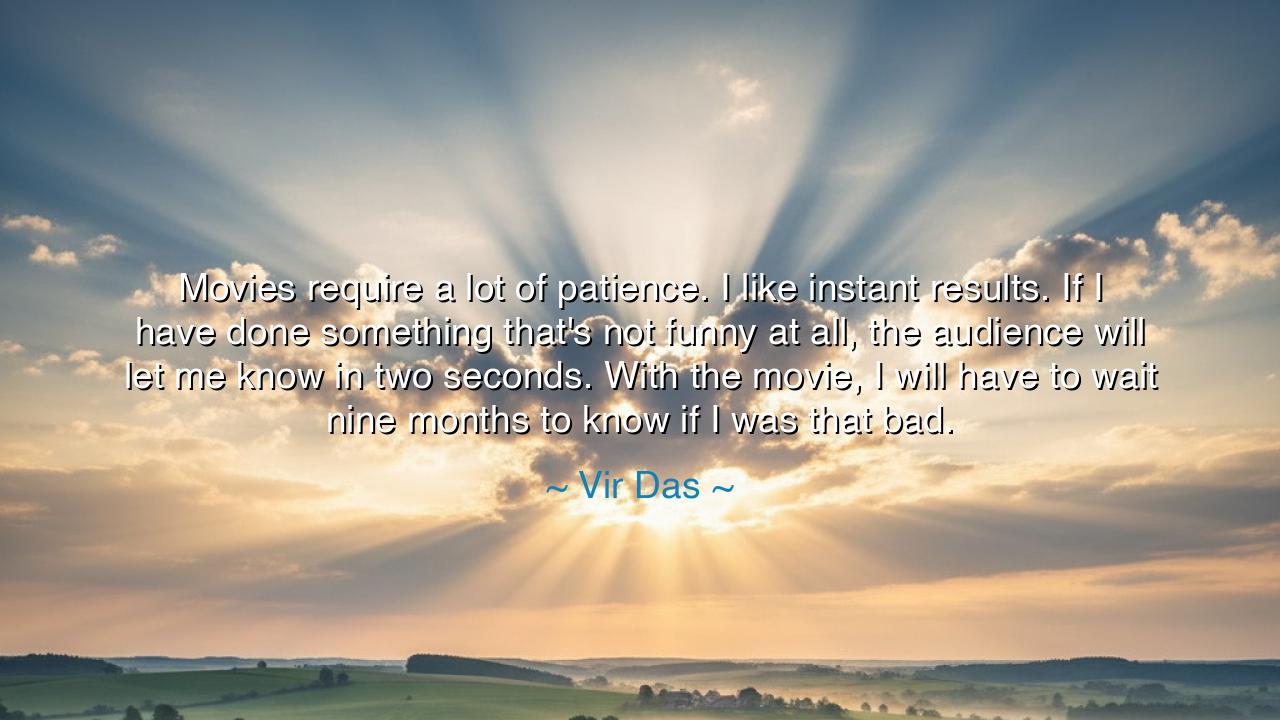
Movies require a lot of patience. I like instant results. If I
Movies require a lot of patience. I like instant results. If I have done something that's not funny at all, the audience will let me know in two seconds. With the movie, I will have to wait nine months to know if I was that bad.






In the words of Vir Das, comedian, actor, and wanderer between stages and screens, we find the eternal struggle of the artist with time itself: “Movies require a lot of patience. I like instant results. If I have done something that’s not funny at all, the audience will let me know in two seconds. With the movie, I will have to wait nine months to know if I was that bad.” Though he speaks of laughter and cinema, his words unveil a profound truth about immediacy and delay, about the human hunger for feedback, and about the discipline required to create what lasts.
For in the world of comedy, the rhythm is swift. The performer casts out a joke, and within the heartbeat of silence or eruption of laughter, he knows whether he has triumphed or failed. The audience, living and breathing before him, is the mirror of his craft. There is no delay, no veil, no buffer—only truth revealed in the moment. In this, Vir Das finds satisfaction, for it is a dialogue as ancient as the storyteller and the crowd around the fire.
But in the realm of movies, the path is longer, heavier, and slower. The work is done in fragments, stitched together with patience, and then hidden away in silence for months before the world delivers its judgment. Here, the artist must live not with instant knowledge, but with doubt and anticipation. He must plant his seed and wait for the harvest, never certain whether it will bear fruit or wither. This is not the quick pulse of comedy—it is the long endurance of cinema.
History reminds us of others who endured such waiting. Michelangelo, painting the Sistine Chapel, toiled for years before unveiling his vision to the world, never knowing whether the Pope or the people would honor his work or condemn it. The playwright Sophocles, once he set his words upon the stage, could only wait until the festival season when his plays would be judged. In every age, creators have wrestled with the tension between instant judgment and delayed reward, between the comfort of immediate feedback and the torment of patient expectation.
The meaning of Das’s words is thus twofold: he celebrates the immediacy of one art form, while recognizing the burden of another. Yet beneath this lies the greater truth: that both paths are necessary. Instant results sharpen the artist, teaching him humility and adaptability. Long delays cultivate patience, resilience, and faith in one’s vision. The one is the fire that tempers steel, the other the slow pressure that forms the diamond. Without both, the artist cannot truly grow.
And so, the lesson for us is clear: in life, we must learn to balance the hunger for instant results with the discipline of waiting. Not every seed sprouts overnight, and not every effort yields immediate praise or correction. Some endeavors—whether raising a child, building a business, or crafting art—require months or years before their worth is revealed. To demand only instant feedback is to limit oneself to shallow victories; to embrace the long wait is to open oneself to deeper, lasting triumphs.
So let Vir Das’s words be remembered as both confession and counsel. Celebrate the moments of instant truth, when the audience shows you who you are in two seconds. But also embrace the trials of long silence, when your work waits in darkness before meeting the world. For the path of greatness requires both the quick reflection of the moment and the slow unveiling of time. Walk both roads with courage, and you will find not only laughter but legacy.






AAdministratorAdministrator
Welcome, honored guests. Please leave a comment, we will respond soon